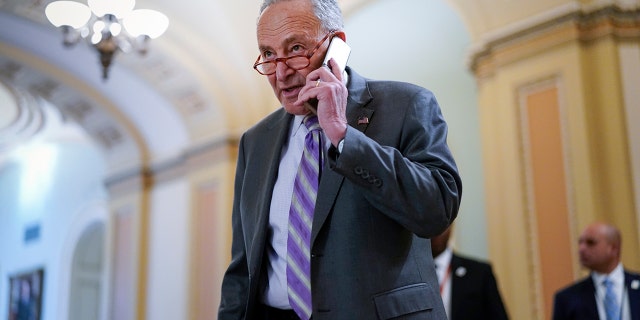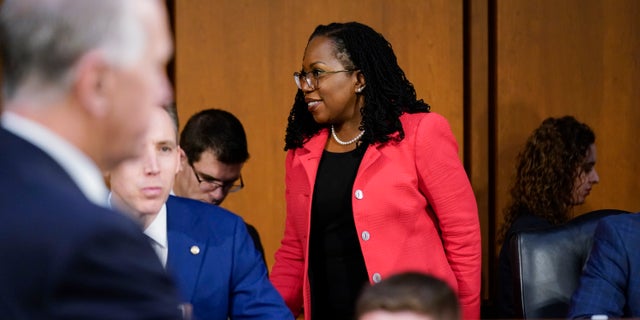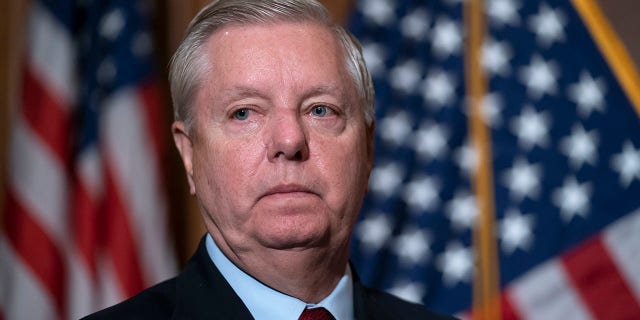NEWYou can now listen to Fox News articles!
If you’re looking for drama or a spectacle, check out the Grammys.
You likely won’t get much of it surrounding the prospective confirmation of Supreme Court nominee Ketanji Brown Jackson in the coming days.
The Senate is on track to confirm Jackson next week. But the confirmation vote will likely be close.
Still, it won’t be a spectacle like the 50-48 confirmation of Justice Brett Kavanaugh in 2018. And, it won’t be nearly as intense as the 52-48 confirmations of Justices Clarence Thomas in 1991 or Amy Coney Barrett in 2020.
Sen. Susan Collins, R-Maine, is a yes. Senate Minority Whip John Thune, R-S.D., believes there could be up to three GOP yeas on the nomination, although Thune isn’t one of them.
Supreme Court nominee Ketanji Brown Jackson meets with Sen. Susan Collins, R-Maine, on Capitol Hill in Washington, March 8, 2022.
(AP Photo/Carolyn Kaster, File)
Here’s what to expect with the nomination over the coming days:
The Senate Judiciary Committee meets Monday, April 4, on the nomination. Technically, the committee also met this past Monday on the nomination. But, by rule, minority members on the panel usually ask that the nomination be “held over” for a week. That’s what happened this time. So the committee really doesn’t tackle the nomination until next week.
GRAHAM FLIPS ON KETANJI BROWN JACKSON, WILL OPPOSE HER SUPREME COURT NOMINATION
Sen. Ben Sasse, R-Neb., is a member of the Judiciary panel and is opposed to the appointment. Sasse’s nay vote means it’s increasingly likely Democrats may need to “discharge” Jackson’s nomination from committee to the floor. Any nomination before any committee cannot go to the floor unless it is somehow sent there by the panel or extracted from the committee via a floor vote.
The nomination doesn’t necessarily need a “positive” recommendation.

In 1991, the Judiciary Committee deadlocked at giving Justice Clarence Thomas a “favorable” recommendation. The full committee finally voted to send Thomas’ nomination to the floor without any recommendation. But, the nomination must secure some sort of vote to dislodge it from committee and send it to the floor. If every vote is deadlocked, the only option is what’s called a “motion to discharge.” This is where the Senate actually culls the nomination of the committee via a simple majority vote on the floor.
The Senate has not had to discharge a Supreme Court nominee since 1853. That was nominee William Micou. But the Senate never confirmed Micou.
The full Senate has voted to discharge 16 nominations from committee already during the 117th Congress. That includes the nomination of Health and Human Services Secretary Xavier Becerra. In fact, the Senate just voted to pull two nominees from committees and send them to the floor over the past few days: Alvaro Bedoya to serve on the Federal Trade Commission and Lisa DeNell Cook to become a member of the Federal Reserve.
The full Senate has wrested five nominees from the Judiciary Committee alone since January of last year.
If the Judiciary Committee is tied on Jackson on Monday, Fox is told the Senate may vote to extricate her nomination from the panel that same day. Senate Majority Leader Chuck Schumer, R-N.Y., could then put the actual Jackson nomination on the floor Tuesday, April 5. He would also file cloture to cut off debate on the nomination. Such nominations don’t require a procedural vote on the front end just to launch debate.

Senate Majority Leader Chuck Schumer, D-N.Y., arrives for a weekly policy luncheon at the Capitol in Washington March 8, 2022.
(AP Photo/J. Scott Applewhite)
By rule, a cloture vote to end debate on a nomination must lay over for a day, meaning the Senate may not be able to vote to close debate until Thursday, April 7. If cloture is filed on Tuesday, April 5, Wednesday serves as the intervening day.
Based on the Senate precedent established by the Senate in 2017 with “Nuclear Option II” to confirm Justice Neil Gorsuch, only a simple majority is required to break a filibuster on Supreme Court nominations.
The Senate often burns multiple hours (afforded under the Senate rules) once senators vote to end debate on a given nominee. It’s unclear how much total time the Senate may need on the Jackson nomination.
So, barring an agreement, this means the earliest the Senate could confirm Jackson would be sometime Thursday, April 7, after the Senate breaks the filibuster. If Senators require more time after the Senate votes to cut off debate, confirmation could come on Friday, April 8, or even over the weekend, perhaps, Saturday, April 9.
But, senators want to get out of town for the Easter/Passover recess. So, Jackson’s confirmation is realistically an April 7 or April 8 project.

Supreme Court nominee Ketanji Brown Jackson arrives for her Senate Judiciary Committee confirmation hearing on Capitol Hill in Washington, March 22, 2022.
(AP Photo/Andrew Harnik)
The nomination needs a simple majority for confirmation.
Sen. Lindsey Graham, R-S.C., previously voted to confirm Jackson to a lower court, as recently as last year. But Graham is a no this time around.
“After a thorough review of Judge Jackson’s record and information gained at the hearing from an evasive witness, I now know why Judge Jackson was the favorite of the radical left,” said Graham.
Graham voted to confirm President Obama’s nominees — Justice Sonia Sotomayor in 2009 and Justice Elena Kagan in 2010.
Sen. Susan Collins, R-Maine, is the only GOP member who has announced support for Jackson. However, Sens. Lisa Murkowski, R-Alaska, and Mitt Romney, R-Utah, are believed to be in play.
IN NEW BOOK, SEN. MIKE LEE WARNS DEMS’ COURT-PACKING TALK COULD ALTER HISTORY IN UNANTICIPATED WAYS
The Senate has never confirmed a Supreme Court Justice via a tie-breaking vote by the vice president. That probably won’t be necessary with at least Collins casting a yea vote. In fact, the Senate had never confirmed any nominee for the executive or judicial branch before former Vice President Pence broke a tie to confirm Betsy DeVos as education secretary in early 2017. A vice president has only broken a tie to confirm a judicial nominee once. Pence broke a tie to confirm Judge Jonathan Kobes on the 8th Circuit of Appeals.

Sen. Lindsey Graham, R-S.C., the ranking member of the Senate Budget Committee, waits to speak to reporters following bipartisan passage of the Ending Forced Arbitration of Sexual Assault and Sexual Harassment Act at the Capitol in Washington, Feb. 10, 2022.
(AP Photo/J. Scott Applewhite, File)
Still, this nomination comes to the floor in the time of COVID.
Twenty lawmakers contracted COVID in March alone. That’s the highest number of members to test positive in one month since the pandemic began. Sen. Bob Casey, D-Pa., was out recently after testing positive. Sen. Ben Ray Lujan, D-N.M., missed more than a month after suffering a stroke.
Unlike the House, the Senate does not have remote voting. And, as we always say, it’s always about the math on Capitol Hill.
CLICK HERE TO GET THE FOX NEWS APP
It’s possible the Senate could delay the procedural vote to end the filibuster on the confirmation vote or the confirmation vote could be delayed further if Democratic senators are unable to vote.